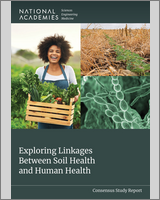NCBI Bookshelf. A service of the National Library of Medicine, National Institutes of Health.
National Academies of Sciences, Engineering, and Medicine; Health and Medicine Division; Division on Earth and Life Studies; Food and Nutrition Board; Board on Agriculture and Natural Resources; Committee on Exploring Linkages Between Soil Health and Human Health. Exploring Linkages Between Soil Health and Human Health. Washington (DC): National Academies Press (US); 2024 Sep 19.

Exploring Linkages Between Soil Health and Human Health.
Show detailsThe National Academy of Sciences was established in 1863 by an Act of Congress, signed by President Lincoln, as a private, nongovernmental institution to advise the nation on issues related to science and technology. Members are elected by their peers for outstanding contributions to research. Dr. Marcia McNutt is president.
The National Academy of Engineering was established in 1964 under the charter of the National Academy of Sciences to bring the practices of engineering to advising the nation. Members are elected by their peers for extraordinary contributions to engineering. Dr. John L. Anderson is president.
The National Academy of Medicine (formerly the Institute of Medicine) was established in 1970 under the charter of the National Academy of Sciences to advise the nation on medical and health issues. Members are elected by their peers for distinguished contributions to medicine and health. Dr. Victor J. Dzau is president.
The three Academies work together as the National Academies of Sciences, Engineering, and Medicine to provide independent, objective analysis and advice to the nation and conduct other activities to solve complex problems and inform public policy decisions. The National Academies also encourage education and research, recognize outstanding contributions to knowledge, and increase public understanding in matters of science, engineering, and medicine.
Learn more about the National Academies of Sciences, Engineering, and Medicine atwww.nationalacademies.org.
Consensus Study Reports published by the National Academies of Sciences, Engineering, and Medicine document the evidence-based consensus on the study’s statement of task by an authoring committee of experts. Reports typically include findings, conclusions, and recommendations based on information gathered by the committee and the committee’s deliberations. Each report has been subjected to a rigorous and independent peer-review process and it represents the position of the National Academies on the statement of task.
Proceedings published by the National Academies of Sciences, Engineering, and Medicine chronicle the presentations and discussions at a workshop, symposium, or other event convened by the National Academies. The statements and opinions contained in proceedings are those of the participants and are not endorsed by other participants, the planning committee, or the National Academies.
Rapid Expert Consultations published by the National Academies of Sciences, Engineering, and Medicine are authored by subject-matter experts on narrowly focused topics that can be supported by a body of evidence. The discussions contained in rapid expert consultations are considered those of the authors and do not contain policy recommendations. Rapid expert consultations are reviewed by the institution before release.
For information about other products and activities of the National Academies, please visit www.nationalacademies.org/about/whatwedo.
- The National Academies of SCIENCES • ENGINEERING • MEDICINE - Exploring Linkages...The National Academies of SCIENCES • ENGINEERING • MEDICINE - Exploring Linkages Between Soil Health and Human Health
Your browsing activity is empty.
Activity recording is turned off.
See more...